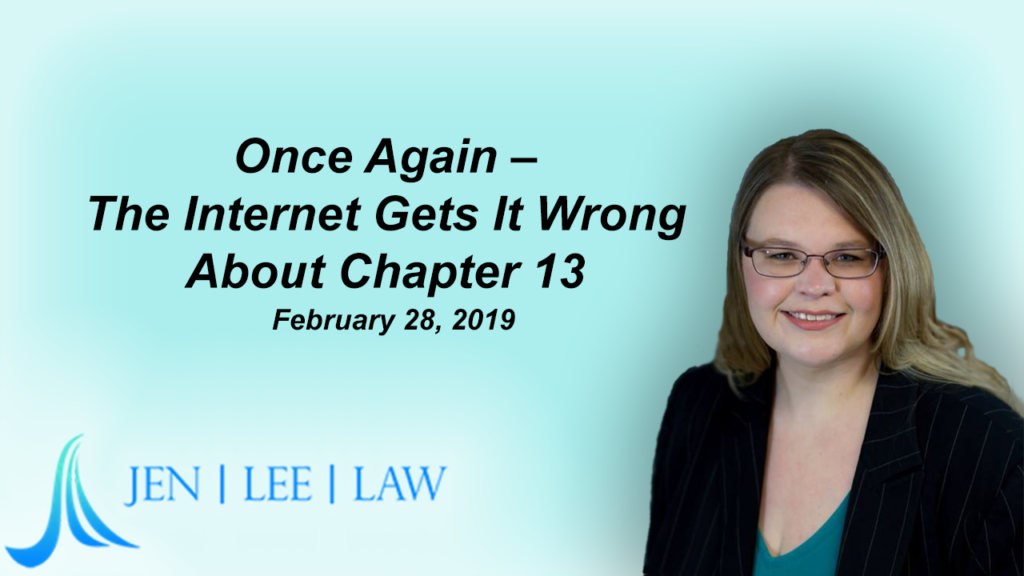Last week’s post talked about two recent articles that were really wrong about how bankruptcy works. Because there were so many things wrong with the first one, I didn’t even get a chance to write about the things wrong in the second one. So, I am taking the opportunity this week to go through the second article because I think bad information on the internet leads so many people to make decisions that are detrimental to their long-term financial future.
Here we go.
First of all, the title of this article is Chapter 11 vs. Chapter 7 Bankruptcy: What to Know. But, the article then discusses Chapter 11, Chapter 7, and Chapter 13. The biggest issue with the whole thing is that these chapters are used for very different situations. It’s not like you walk into an attorney’s office and you just pick a chapter to file. Your financial goals and situation generally determine which route you need to go down.
Let’s get to down to the dirty details:
- “Chapter 11 bankruptcy is a form of bankruptcy that exists to allow businesses and corporations to follow a plan to rehabilitate or reorganize their debts so that they can remain in operation while repaying their debt.”
Partly true. Business and corporations are eligible to file for Chapter 11, but you don’t have to be a business or corporation to file for Chapter 11. Individuals can file Chapter 11. - “Shouldn’t affect your personal credit score. If you file for Chapter 11 bankruptcy as a corporation or business, it shouldn’t affect your personal credit score.”
Be very careful with this – a lot of banks and lenders require the business owner to personally guarantee credit cards, loans, lines of credits, and leases, so filing bankruptcy for a corporation can actually affect your personal credit score. - “Stays on credit report for 10 years: This can be especially discouraging if you file as an individual since your score may be hit pretty hard.”
Oh, for the love of Pete. Yes, bankruptcy stays on your credit report as a public record for 10 years. It does not affect your credit score for 10 years and many people with low credit scores actually experience their credit score going up immediately upon filing bankruptcy. With proper rebuilding strategies, you can have a 700 credit score a year after bankruptcy. - “People who file for Chapter 7 bankruptcy typically earn lower incomes and can’t repay their debts. To qualify for Chapter 7 bankruptcy, you must be earning less than your state’s median income for a family or household of your size.”
This is just wrong. One way to qualify for Chapter 7 is to be below the median income for your household size. However, I can’t remember the last time I had a client who was below median income. You can still qualify for Chapter 7, but it’s important to have a professional run the Means Test to determine eligibility. Also, there are certain categories of debts that make the Means Test not even apply. For example, if 51% of your debts are non-consumer debts (taxes, business loans, etc.), the Means Test doesn’t even apply to your situation. - “Income status requirements: Chapter 7 bankruptcy is limited to those with low income and minimal assets.”
See #4? There are often ways to qualify for Chapter 7 without being low income. And, assets have nothing to do with your eligibility requirements for Chapter 7. - “Stays on credit report for up to 10 years: Because of this, filing for Chapter 7 bankruptcy may make it difficult for you to get credit or insurance, and may even make it challenging to be hired for a new job or get approved to rent a new apartment.”
Talk to a professional in your state. In California, your credit score isn’t used in insurance unless it’s to make your premium lower (credit score can only be used to decrease, not increase or deny, insurance premiums). Also, in California, credit scores and bankruptcy can only be used in very specific situations for hiring. I have lots and lots of clients who get new apartments or houses during and after bankruptcy. It sometimes takes a bit more searching and explanation, but any smart landlord prefers someone who filed bankruptcy than someone with 20 collection accounts on their credit report. - “Chapter 13…In many cases, you’ll pay off most of your debt with monthly payments over the course of three to five years, after which time the rest of your debt is discharged.”
This is one of the biggest myths about Chapter 13 – you don’t pay off most of your debt necessarily. You do make payments for three to five years, but often we are paying back mortgage arrears, taxes, and child support for the three to five years while the credit cards and collection accounts get very little and are discharged at the end. - “Most individuals or business qualify for Chapter 13.”
Businesses that are corporations do not qualify for Chapter 13. There are two requirements for Chapter 13. You have to be an individual and you have to have regular income. You can be a sole proprietor of a business and be in Chapter 13, but if you are the owner of a corporation, the corporation cannot file Chapter 13. Quite often, the business owner took on a bunch of personal debt for the corporation and we file a Chapter 13 to reorganize those debts, but the bankruptcy is filed for the individual. - “If you’ve been discharged from Chapter 13 or another type of bankruptcy within the last two to four years, you may not qualify to file.”
Oh, where do I start. The waiting times between bankruptcies are from filing date to filing date. Your discharge date has nothing to do with the waiting times. The longest wait is 8 years and the shortest is 2 years. Please have a professional tell you what your eligibility is based on your individual situation.
Overall, please know your rights and options. Please have a professional look at your situation and please do not assume that something you read on the internet was correct, especially because a lot of these issues depend on the state you live in.
Here’s the article:
https://www.lendingtree.com/bankruptcy/chapter-11-vs-chapter-7-bankruptcy/
This is just a basic overview and is not legal advice specific to your situation. If you have questions about your rights when it comes to debt and credit, you should speak with an attorney in your area for legal advice. If you live in California or North Dakota and would like to speak with Jen Lee Law regarding your situation, please schedule an appointment.



